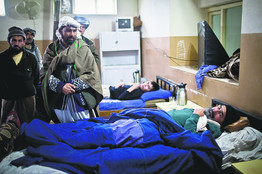By Maria Abi-Habib
MAZAR-E-SHARIF, Afghanistan—Government officials in northern Afghanistan are building up their own ethnic-based militia groups to expand their influence and keep the Taliban at bay.
But the spread of mostly Tajik and Uzbek militias is aggravating tensions with local Pashtuns—the country's largest ethnic group but a minority in the north—some of whom say they are being driven to turn to the Taliban, a largely Pashtun group, to defend their interests.
The Taliban insurgency only flared up in the north over the past year, using scattered Pashtun villages as its bases, as Afghan security forces and the North Atlantic Treaty Organization focused their attention on more dangerous parts of the country. The private militias began appearing around the same time, their numbers surging ahead of parliamentary elections in September and growing significantly in recent months.

Abdul Ghafar, front, in a Mazar-e-Sharif hospital in February. Mr. Ghafar, says militiamen shot him and killed his son in order to seize his land. (Bryan Denton for The Wall Street Journal)
What has followed has been a buildup along the fault lines of the country's civil war of the 1990s. "Nobody wants to be the weakest one around, when the insurgency is consolidating itself and rivals are getting stronger," said Martine van Bijlert, a senior researcher with the Kabul-based Afghanistan Analysts Network.
The governor of Balkh province, the Tajik former warlord Gen. Mohammed Atta Noor, runs at least two such militias, in districts close to Mazar-e-Sharif, the provincial capital and northern Afghanistan's largest city. These groups are separate from the U.S.-backed, and more closely supervised, village defense forces known as the Afghan Local Police, or ALP.
Gen. Atta said the militias were needed to secure Balkh because President Hamid Karzai's government rejected his requests for ALP units, and refused to increase police and army ranks in Balkh.
Central government officials say Afghan forces are spread too thin to increase deployment in the north. Mr. Karzai has publicly called for the dissolution of all irregular militias like those run by Gov. Atta.
In a sign of these militias' growing dominance, in Balkh province's impoverished Chimtal and Charbolak districts, the 452 militiamen affiliated with Gov. Atta outnumber the 280 policemen, according to police figures.
Some Pashtuns in the north say the militias prevented them from voting in September, whittling down their numbers in the current parliament, an allegation northern officials deny.
In addition, police reports and witnesses say militia members regularly rob Pashtun villagers. In one case, a tribal elder says militiamen shot him and killed his son to seize their land.
Some Pashtuns say the Taliban wouldn't be thriving in the north if the private militias didn't abuse Pashtun residents. "When they patrol, they say they're there to fight the Taliban," complained Tajdin Khodam, a 20-year-old Pashtun who is studying to be an Islamic scholar in Balkh. "But their very presence has created the Taliban." Mr. Khodam said militiamen flaunted their affiliation to Gen. Atta to force farmers to hand over livestock, and forced village women to make them winter clothes.
Gen. Atta dismissed such complaints. "The people who complain about militia are people who have links with the Taliban," he said. Mr. Khodam says he has no links to the Taliban.
The chief of Gen. Atta's militia in Charbolak, an ethnic Uzbek man known as Cmdr. Lal, said there is discrimination among some militias against Pashtuns, "but not in my group."
The militias use their own weapons and don't receive any salaries, Gen. Atta said. Militias make up for lack of pay, some Pashtun residents say, by the pillage of Pashtun villages.
From a hospital bed in Mazar-e-Sharif, 56-year-old tribal elder Abdul Ghafar spoke in hushed tones about the militiamen who shot him and killed his son to take control of their land in September. "There's no justice for people like me. I've asked the government to arrest these men and bring them to court, but nothing's been done," he says.
Mr. Ghafar says he has no affiliation with the Taliban.
Asked about the case, Balkh police chief Gen. Esmatullah Alizai, an ethnic Pashtun, said "I worry that these militias abuse their power but have a close relationship with powerful people in Mazar and have protection."
In addition to Gov. Atta's militias, similar irregular forces have been created by officials of the National Directorate of Security and police chiefs in the north, according to Western and Afghan officials. NDS and local police officials denied running militias.
The commander of all ministry of interior forces in the north, Gen. Mohammed Daoud Daoud, says he frequently uses these irregular militias in his operations against the Taliban. "The NDS built all these militias," he adds.
While militia sponsors in the north want these groups to be folded into the ALP program, something that would provide American backing, coalition officials resist the idea.
"If you took the armed groups in the north and tried to convert them into ALP, they wouldn't qualify," said a senior international official knowledgeable about the ALP program, describing many of these men as thugs who would stir up ethnic tensions. "I've told the Afghans: They're not our militias."
—Walid Fazly contributed to this article.



